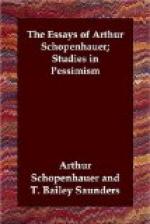If, then, their nature is merged in that of the species, how shall their existence go beyond it? The curse of vulgarity puts men on a par with the lower animals, by allowing them none but a generic nature, a generic form of existence. Anything that is high or great or noble, must then, as a mater of course, and by its very nature, stand alone in a world where no better expression can be found to denote what is base and contemptible than that which I have mentioned as in general use, namely, common.
* * * * *
Will, as the thing-in-itself, is the foundation of all being; it is part and parcel of every creature, and the permanent element in everything. Will, then, is that which we possess in common with all men, nay, with all animals, and even with lower forms of existence; and in so far we are akin to everything—so far, that is, as everything is filled to overflowing with will. On the other hand, that which places one being over another, and sets differences between man and man, is intellect and knowledge; therefore in every manifestation of self we should, as far as possible, give play to the intellect alone; for, as we have seen, the will is the common part of us. Every violent exhibition of will is common and vulgar; in other words, it reduces us to the level of the species, and makes us a mere type and example of it; in that it is just the character of the species that we are showing. So every fit of anger is something common—every unrestrained display of joy, or of hate, or fear—in short, every form of emotion; in other words, every movement of the will, if it’s so strong as decidedly to outweigh the intellectual element in consciousness, and to make the man appear as a being that wills rather than knows.
In giving way to emotion of this violent kind, the greatest genius puts himself on a level with the commonest son of earth. Contrarily, if a man desires to be absolutely uncommon, in other words, great, he should never allow his consciousness to be taken possession of and dominated by the movement of his will, however much he may be solicited thereto. For example, he must be able to observe that other people are badly disposed towards him, without feeling any hatred towards them himself; nay, there is no surer sign of a great mind than that it refuses to notice annoying and insulting expressions, but straightway ascribes them, as it ascribes countless other mistakes, to the defective knowledge of the speaker, and so merely observes without feeling them. This is the meaning of that remark of Gracian, that nothing is more unworthy of a man than to let it be seen that he is one—el mayor desdoro de un hombre es dar muestras de que es hombre.




